Ten years ago, the plug was pulled on Parachute festival.
The founder doesn't have any regrets. But he does have advice for any promoters doing it tough.
On March 29, 2014, Mark de Jong was exhausted.
He’d been awake for nearly two days straight operating out of a “war room” set up in Auckland.
A communications strategy had been planned.
Key stake holders had been informed.
TV interviews were booked.
Sponsors, staff, media and fans were all kept abreast of the situation.
A press release was issued.
Anyone who had anything to do with Parachute – de Jong’s Christian music event that became the Southern Hemisphere’s longest-running multi-day music festival – was told the news.
After 24 years, de Jong was cancelling Parachute – for good.
Of that moment in 2014, the festival’s founder says: “It was difficult … it was bedlam. It was sad, it was tough. We knew we were disappointing a lot of people. Even our staff didn't know until a few days ahead.
“It meant significant redundancies.”
Even de Jong’s wife Chris lost her job in the fallout.
“It was going to change everything.”
De Jong spent two days spent responding to interview request after interview request.
People wanted to know what he was doing, why he was cancelling something that had been so successful, and had touched the lives of hundreds of thousands of people.
They told him: “Parachute was the best time of my life.”
They asked him: “Why?”
Then his phone rang again. It displayed an unregistered number.
When he answered it, the Prime Minister introduced himself.
He said: “Hey Mark, it’s John Key here. I just heard Parachute has been cancelled … I’m surprised you didn’t talk to me about it.”
De Jong was taken aback. Key had attended his festival several times and spoken briefly to the crowd. Labour leaders had too.
But the pair weren’t close. De Jong didn’t consider Key a friend.
Nonetheless, a few days after his call, de Jong found himself sitting in a boardroom with Key, Steven Joyce and several other National Party MPs.
They had questions for him. They all wanted to know what had led to de Jong ending his “cultural institution” at a time when it still seemed so popular.
“They wanted to know … if there was anything that would help to keep it going,” says de Jong. “It was very flattering, and seductive in a way.”
It made him stop and reconsider his decision.
“I had to ask myself, ‘Why are we finishing this?’”
But his mind was made up.
Even the Prime Minister couldn’t change it.
“I knew the era was over.”
‘It grew, and grew, and grew, and grew, and grew.’
Up until that moment, Parachute was the little music festival that could.
Launched in 1992, de Jong started his festival because he wanted somewhere for his favourite Christian bands to be able to perform in one place.
“We thought, ‘Let's start an event so they have somewhere to play.’”
Waikanae’s El Rancho Christian Holiday Camp was chosen, invites were sent out, bands were booked, a long weekend was confirmed, and tents were erected.
That first year, 1200 people showed up. “That was pretty good,” says de Jong. “It was significant.”
By 1995, Parachute was attracting crowds of 3500 and much bigger bands. It needed a new location. De Jong chose Matamata’s Totara Springs Christian Centre.
From there, he and his festival team watched the festival numbers explode.
“It grew, and grew, and grew, and grew, and grew,” says de Jong. “We had no idea it would grow in the way it grew. It was exciting. It was amazing. Every year it would grow by at least 20 per cent. Some years it doubled.”
That’s because the festival attracted young church-goers who wanted to cut loose at a music festival, and perhaps weren’t allowed to attend competing non-Christian events like Big Day Out or Rhythm & Vines.
At Parachute, no alcohol was allowed to be sold. One former punter told me that fact helped convince her parents she should be allowed to attend a three-day music festival at the age of 13 on her own.
There, she jumped in her first moshpit, and learned how to crowd surf. “It was wild,” she says. She and her friends went to every single one she could.
Soon, Parachute was attracting tens of thousands of people to see 100 bands play across three days. As the event grew it was forced to move again, this time to the Mystery Creek Events Centre.
It got so big media was forced to start covering it. Headliners morphed from Christian music staples to radio-friendly acts everyone knew: Switchfoot, Relient K, Elemeno P, Evermore, MXPX, Vince Harder, Avalanche City and Stan Walker.
That is the moment de Jong remembers as the festival’s peak, with numbers maxing out at 27,500. Suddenly, his little festival for his mates was attracting some of the world’s biggest bands, and the Southern hemisphere’s biggest crowds.
“The whole thing was going into a different realm,” he says. “We were dealing with American booking agents, managers … we were just these bumpkins running this festival [in New Zealand]. They were the good days.”
Paradoxically, it was also the beginning of the end. When a festival gets bigger, de Jong says that doesn’t necessarily mean it’s easier. “Your costs just blow up,” he says. So he diversified, setting up a studio space in Auckland, managing artists, running different events and founding a record label, all of which he still does today.
But his festival “dominated everything, it consumed everything”.
De Jong remembers the stress getting to him and his team. “I don't think we'd get away with doing the hours we were working, and the stress we were putting on people, today,” he says. “I don't think health and safety would allow you to. It was so intense.”
When crowd numbers started dropping, de Jong could see the writing on the wall.
“Your costs are still massive, the financial pressures were massive,” he says. “It's just not that much fun any more. Everything's about cutting and getting smaller.
“I went, ‘I don’t want to spend the rest of my life doing this.’”
So, in 2014 – the year after Parachute set the record as New Zealand’s longest-running multi-stage music festival, a title it still holds today – de Jong called his board, wrote his press release and set up his war room.
It was time to pull Parachute’s eject button.
‘A wise person can see when a season is coming to an end.’
In his press release, de Jong cited “a saturated events market” as one of the reasons Parachute was no longer able to keep going.
Ask him today, though, and de Jong says there were only half a dozen competing festivals. (It was a tough time for them all: Rhythm & Vines was having its own issues, and the Big Day Out would be cancelled permanently just a few months later.)
Here, in 2024, this is relevant. We’ve just had a summer unlike any other with more than 100 separate events on offer. It is a stacked, slammed and supersized festival landscape that’s bigger than ever.
Can it last? Almost certainly, it can’t. In Australia, the bellwether for our own festival scene, big name festivals like Groovin the Moo and Splendour in the Grass are dropping like flies, and others are following in their wake.
We’re seeing signs of a festival market pushed to capacity here too: Nest Fest has gone under, and Morningside Live Block Party was canned before it even got a chance. More seem sure to follow.
Ask de Jong about all this and he shakes his head. Even with the prime minister backing him, there was no way Parachute was going to make it past 2014, he says.
“The wise person can see when a season is coming to an end,” he says. “Summer doesn't go on forever. When winter is coming, and you keep acting like it's summer, you're going to get very wet.”
In the aftermath of its cancellation, de Jong pivoted Parachute into a brand that continues to this day. He spends his time overseeing staff, artists, recording studios and mentorship programs from a sunlit Kingsland office with hanging plants, stained floors and a copy of Guru’s Jazzmatazz, Vol. 1 sitting near the record player.
He was happy with his decision then. And he’s happy with that decision now.
But he does have some advice for his fellow promoters, those wondering if it’s worth keeping going, even if the numbers aren’t quite stacking up.
“Generally, a person running a festival [is] very optimistic. That's how they brought it to life,” he says. But de Jong urges them to read the tea leaves, survey the landscape around them and work out whether or not their event still has a place in it.
“That optimism can leave you bankrupt or your legacy shattered,” he says.
“You keep believing, it falls on you – and it can kill you.”
Thanks for reading Boiler Room. I’m happy you’re here. If you can, consider upgrading your subscription. That’s three newsletters a week all for the price of a cup of coffee once a month. (If you can’t, please reach out and I’ll comp you a sub.)





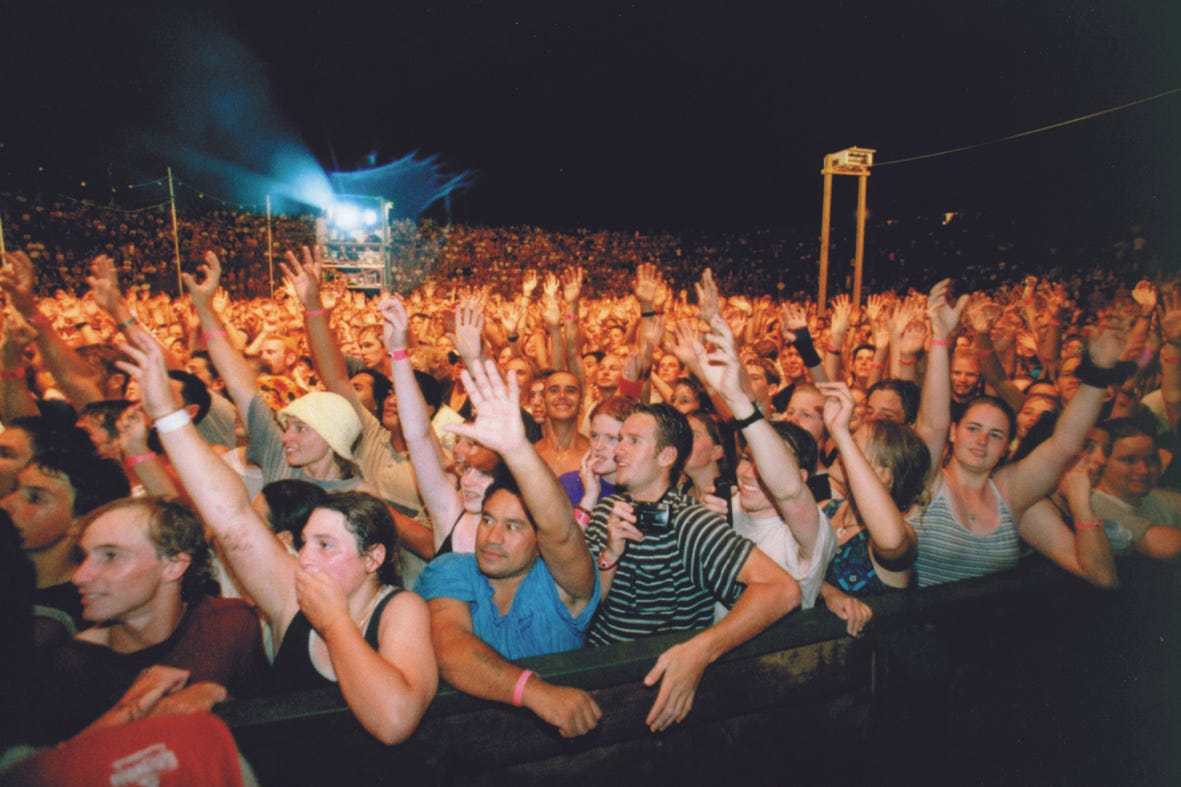
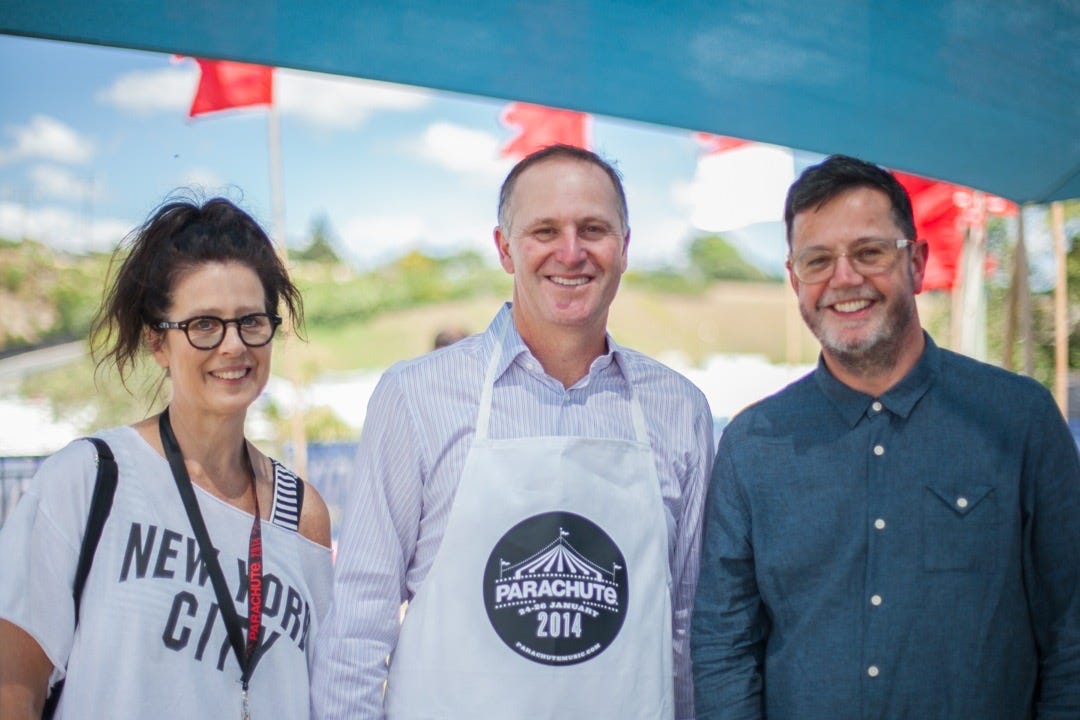

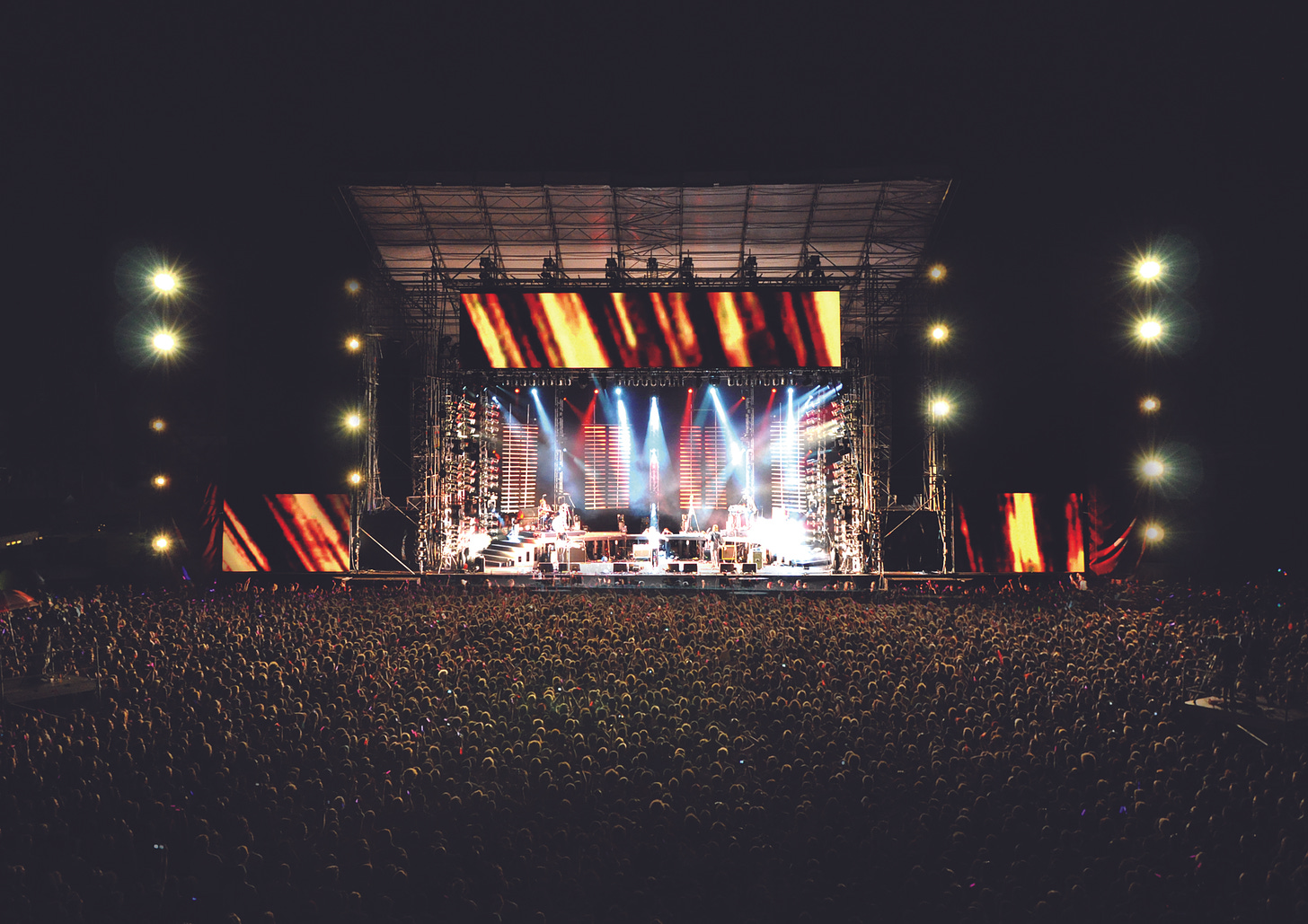
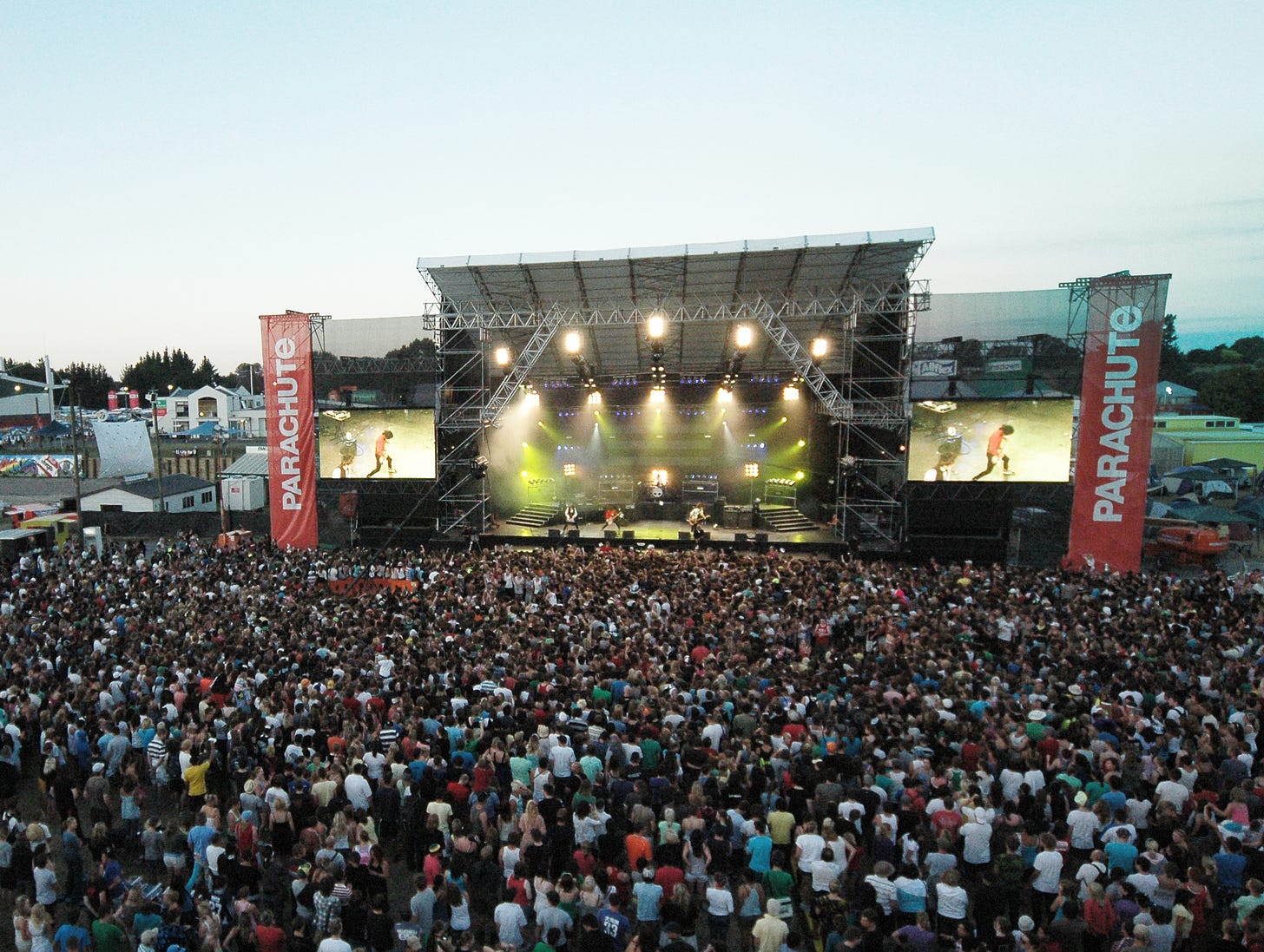

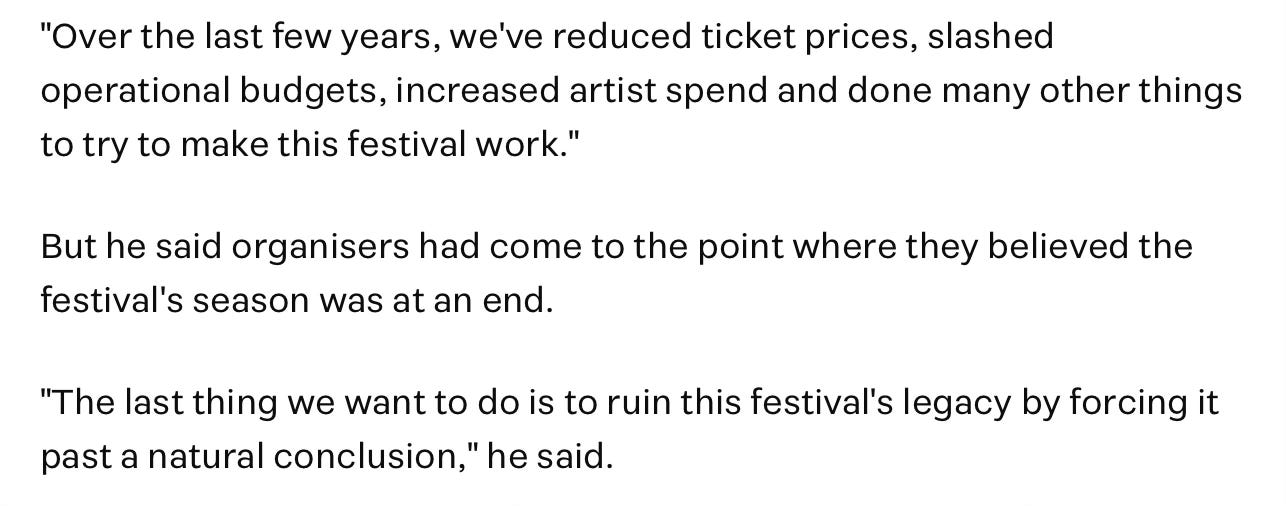

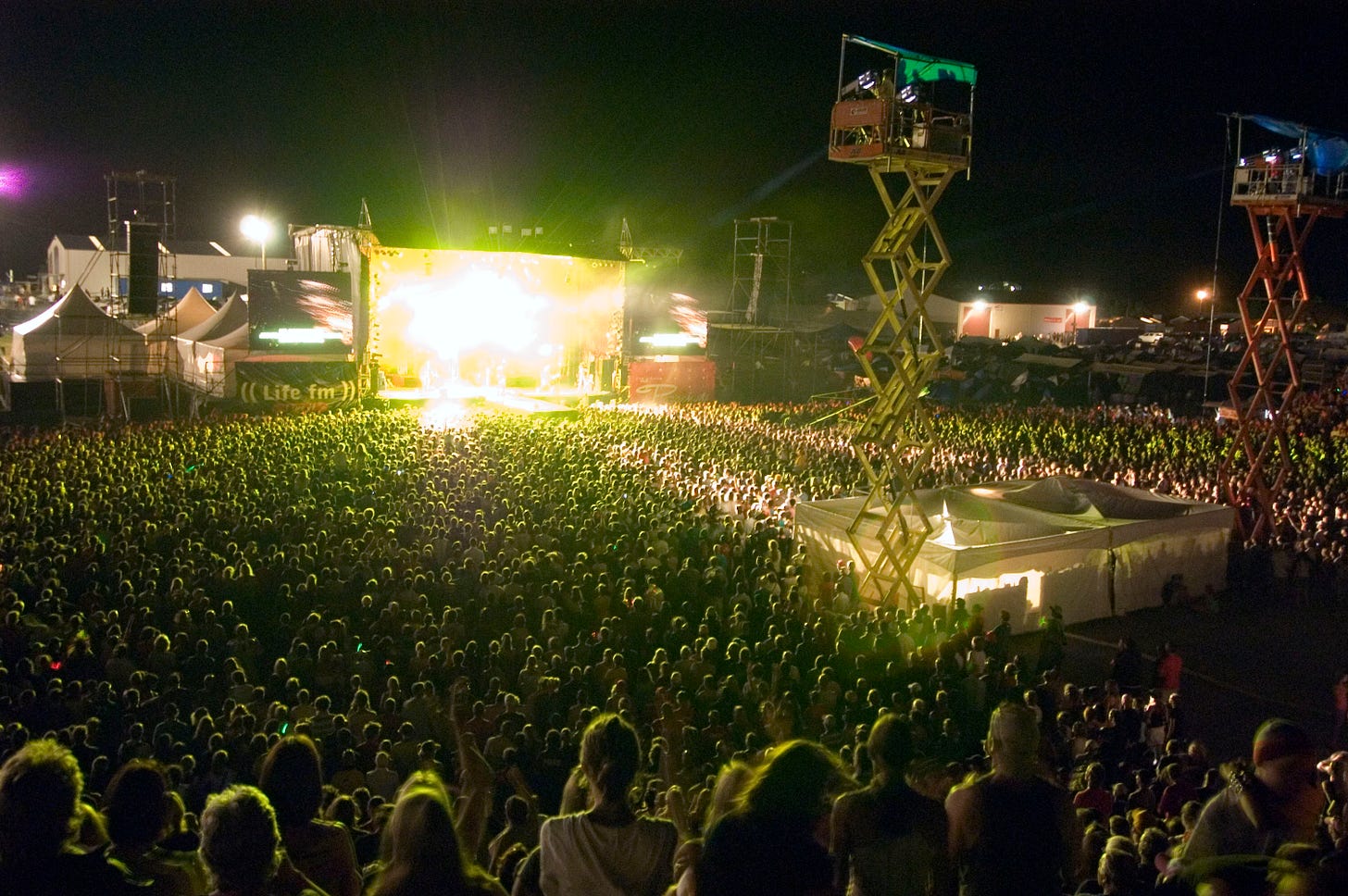

Someone reminded me of this incident, which happened at Parachute, so it wasn't 100% sunshine and roses: https://pantograph-punch.com/posts/missing-screws-and-disappearing-months-living-in-the-shadow-of-a-traumatic-brain-injury
First attended as a 12 year old( with my family) in 1998 & it totally opened my world up to the joy of concerts & festivals - it spurred me to get to Big Day Outs in my late teens and 20s & love a good gig big or small.
As for parachute, Didn’t miss one through my teens and into 20s, even getting to perform at a handful & interview some great headliners in a media capacity. Very good memories for this Christian kid from a town like Palmy